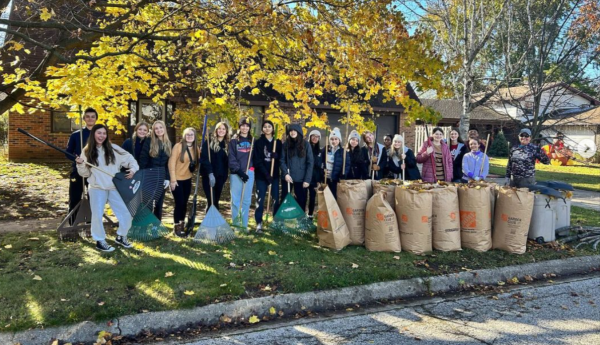AP Tests: How to Handle the Stress and Ensure Success
The Prairie Ridge Library’s cart of AP test resources displays this sign.
AP testing is right around the corner, which means, according to Student Services Coordinator Mrs. Schwartz, 422 students will be cramming for their exams in hopes that they will be able to retain a year’s worth of information long enough to take one–or several–three-hour-long test(s). A whopping total of 912 AP exams will be administered at Prairie Ridge this year, so if we want to get technical, that equates to about two AP tests per student, on average.
And so it happens: As much as we try to ignore it, try to cram it away in the smallest corner of our minds so that we forget it, it always comes creeping back to the surface — stress: the infamous, unstoppable demon that we are all forced to battle at least a trillion times in our lifetime. And now, in the last week before AP testing begins, it resurfaces yet again, this time with biting fangs and a dagger in each hand.
But if we’ve learned anything at all in our time here at school, we know that we have two choices in this situation: soldier through, or surrender completely.
Assuming–and hoping–that the majority of students choose to soldier through, here are a few helpful tips to reduce stress and forge a path to success for the coming weeks of AP testing:
Practice, practice, practice!
By now, we’re all familiar with the quote “practice makes perfect.” And while it may seem the impossible to achieve actual perfection, especially when it comes to conquering your AP classes in one week, practice will definitely help guide you in the right direction. Aside from utilizing all the test tips and practice packets your teachers give you, it may be to your benefit to attend one or more of the AP practice test sessions PR has to offer this week.
PR Junior Julia Alvey, who took one AP class last year and will take many more this year, explains how “sitting down and feeling the marathon of testing” by taking a practice test last year really “gave [her] more of an idea of what to expect” and dissipated the stress that comes with “the thought of the unknown.”
It’s never a good time when you go into a test completely blind, let alone an AP test, so taking advantage of any last-minute practice that gets thrown at you is definitely a good option if you want to avoid the stress of the unknown.
Catch Some ZZZs
While late night video gaming or binge-watching Netflix shows may seem like a good idea on the coming school nights when you feel stressed and in need of some relaxation, in reality, the best way to relieve and prevent stress is simply to get enough sleep.
From a study on stress and sleep in teens, American Psychological Association reports that “ninety percent of teens with low reported stress levels during the past school year say they get enough sleep, compared to less than half (48 percent) of teens with high reported stress levels during the past school year.” They also share that “teens who sleep fewer than eight hours on a school night are more likely than teens who sleep at least eight hours on a school night to report experiencing symptoms of stress,” proving that the right amount of sleep can spare you from feeling unwanted stress before the AP tests.
“Taking tests when your brain has hit a wall of tiredness is hard,” says junior Sydney Tidler. After getting an adequate night’s sleep she feels “good and chipper” and therefore stress-free for the day ahead.
In addition to relieving stress, sleep can help with memorization. According to Harvard Health Publications, “a 2010 Harvard study suggested that dreaming may reactivate and reorganize recently learned material, which would help improve memory and boost performance,” showing just how effective and helpful sleep can be, especially around the time students cram for AP tests.
Be Confident in Yourself
Whether you believe you’ve done everything to prepare for you AP exams or not, it’s good to feel confident in yourself and your abilities so that your test-taking experience is more positive than negative.
An article about the benefits of self-confidence on Livestrong.com reveals that “self-confidence can help you overcome obstacles and pursue and use those skills you own to succeed” in addition to “[helping] you to take on the world with more energy and determination,” proving that having a little confidence in yourself can’t hurt at all.
Elaine Poole, a junior, believes that having self-confidence helps you when taking tests because “you can focus more on the questions rather than focusing on how you might do bad.”
So whether you’re studying or just walking into the testing room, allow yourself to feel confident in your abilities and tell yourself that “you can do this” for a more positive outcome.
Keeping these tips in mind as the impending weeks of AP testing loom over us will ensure a less stressful testing experience so that, as Effie Trinket from the Hunger Games would put it, “may the odds be ever in your favor.”














